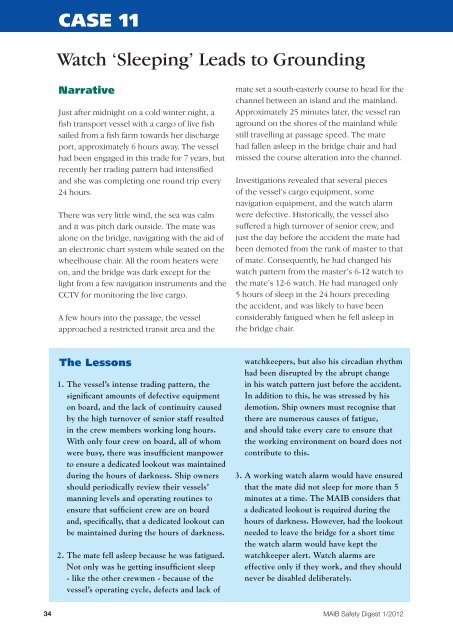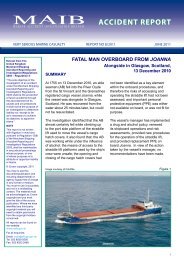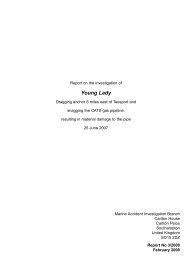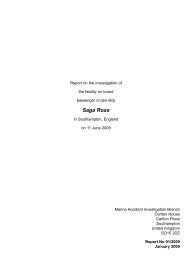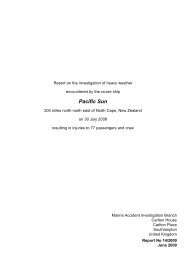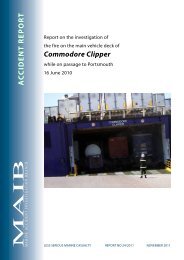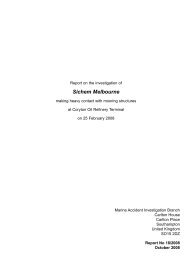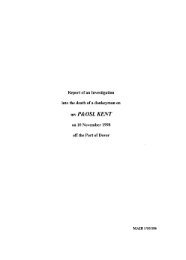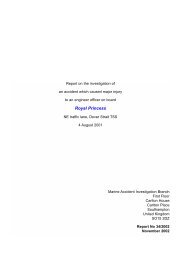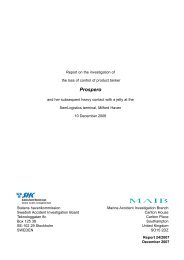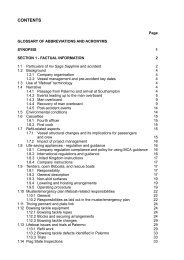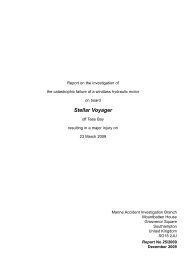Part 1 - Merchant Vessels - Marine Accident Investigation Branch
Part 1 - Merchant Vessels - Marine Accident Investigation Branch
Part 1 - Merchant Vessels - Marine Accident Investigation Branch
You also want an ePaper? Increase the reach of your titles
YUMPU automatically turns print PDFs into web optimized ePapers that Google loves.
CASE 11<br />
Watch ‘Sleeping’ Leads to Grounding<br />
Narrative<br />
Just after midnight on a cold winter night, a<br />
fish transport vessel with a cargo of live fish<br />
sailed from a fish farm towards her discharge<br />
port, approximately 6 hours away. The vessel<br />
had been engaged in this trade for 7 years, but<br />
recently her trading pattern had intensified<br />
and she was completing one round trip every<br />
24 hours.<br />
There was very little wind, the sea was calm<br />
and it was pitch dark outside. The mate was<br />
alone on the bridge, navigating with the aid of<br />
an electronic chart system while seated on the<br />
wheelhouse chair. All the room heaters were<br />
on, and the bridge was dark except for the<br />
light from a few navigation instruments and the<br />
CCTV for monitoring the live cargo.<br />
A few hours into the passage, the vessel<br />
approached a restricted transit area and the<br />
The Lessons<br />
1. The vessel’s intense trading pattern, the<br />
significant amounts of defective equipment<br />
on board, and the lack of continuity caused<br />
by the high turnover of senior staff resulted<br />
in the crew members working long hours.<br />
With only four crew on board, all of whom<br />
were busy, there was insufficient manpower<br />
to ensure a dedicated lookout was maintained<br />
during the hours of darkness. Ship owners<br />
should periodically review their vessels’<br />
manning levels and operating routines to<br />
ensure that sufficient crew are on board<br />
and, specifically, that a dedicated lookout can<br />
be maintained during the hours of darkness.<br />
2. The mate fell asleep because he was fatigued.<br />
Not only was he getting insufficient sleep<br />
- like the other crewmen - because of the<br />
vessel’s operating cycle, defects and lack of<br />
mate set a south-easterly course to head for the<br />
channel between an island and the mainland.<br />
Approximately 25 minutes later, the vessel ran<br />
aground on the shores of the mainland while<br />
still travelling at passage speed. The mate<br />
had fallen asleep in the bridge chair and had<br />
missed the course alteration into the channel.<br />
<strong>Investigation</strong>s revealed that several pieces<br />
of the vessel’s cargo equipment, some<br />
navigation equipment, and the watch alarm<br />
were defective. Historically, the vessel also<br />
suffered a high turnover of senior crew, and<br />
just the day before the accident the mate had<br />
been demoted from the rank of master to that<br />
of mate. Consequently, he had changed his<br />
watch pattern from the master’s 6-12 watch to<br />
the mate’s 12-6 watch. He had managed only<br />
5 hours of sleep in the 24 hours preceding<br />
the accident, and was likely to have been<br />
considerably fatigued when he fell asleep in<br />
the bridge chair.<br />
watchkeepers, but also his circadian rhythm<br />
had been disrupted by the abrupt change<br />
in his watch pattern just before the accident.<br />
In addition to this, he was stressed by his<br />
demotion. Ship owners must recognise that<br />
there are numerous causes of fatigue,<br />
and should take every care to ensure that<br />
the working environment on board does not<br />
contribute to this.<br />
3. A working watch alarm would have ensured<br />
that the mate did not sleep for more than 5<br />
minutes at a time. The MAIB considers that<br />
a dedicated lookout is required during the<br />
hours of darkness. However, had the lookout<br />
needed to leave the bridge for a short time<br />
the watch alarm would have kept the<br />
watchkeeper alert. Watch alarms are<br />
effective only if they work, and they should<br />
never be disabled deliberately.<br />
34 MAIB Safety Digest 1/2012


